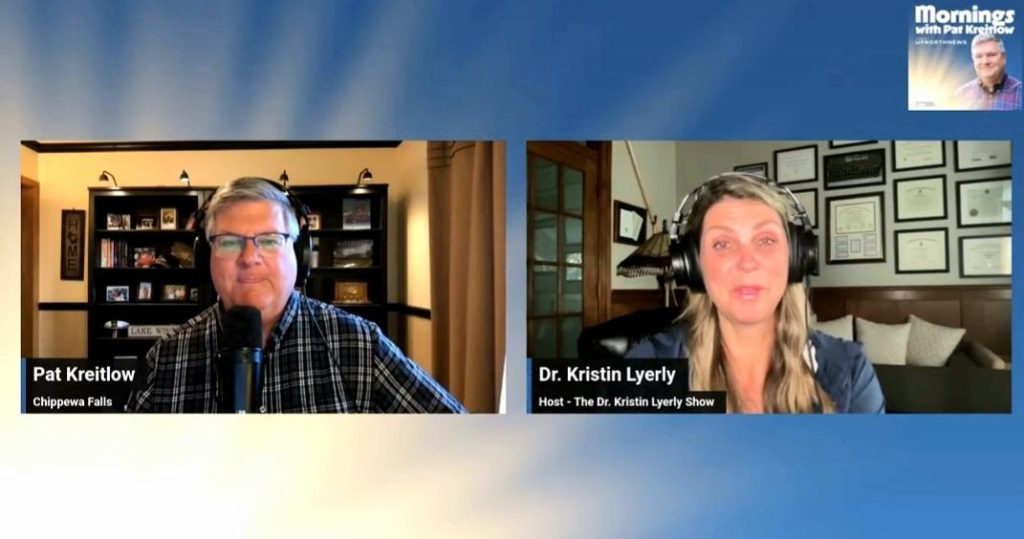
Source: Kristin Lyerly Campaign
Dr. Kristin Lyerly Describes Sobering Visit to Washington, D.C.
Lyerly shares what she witnessed in the nation’s capital and why cuts to Medicaid and student loan programs are putting the future of medical care at risk
She has some serious observations to share following a sobering visit to Washington, D.C. Dr. Kristin Lyerly was there to advocate for rural health care access as part of her ongoing work with the American College of Obstetricians and Gynecologists (ACOG). Lyerly joined Pat Kreitlow, host of Mornings with Pat Kreitlow, to discuss her efforts during a week of sweltering weather.
“It was really good, but really, really hot,” Lyerly says. “I went for a walk on the National Mall and came back completely soaked.”
It’s not just an attack on people—it’s an attack on the places they receive care.
Dr. Kristin Lyerly on advocating for rural health care
But it wasn’t just the weather that left a strong impression. Lyerly described a changed atmosphere in the capital as one that felt unsettling and increasingly closed off.
“The vibe. It felt authoritarian,” she explains, referring to new security measures and imagery around key buildings. “There’s this massive USDA building with a banner of Abraham Lincoln on one side and a stern-looking Donald Trump on the other. The juxtaposition is just really uncomfortable.”
Her walk near the White House confirmed a growing sense of fortification.
“The perimeter keeps moving back,” she says. “You can’t even get across the streets to the fence that surrounds the White House anymore. Police are everywhere. People are talking in hushed tones. It’s bizarre.”
Watch the entire discussion on YouTube, starting at 32:00, here.

Lyerly tells Kreitlow about being there to join fellow OB-GYNs and public health advocates to highlight the deepening crisis facing rural health care, especially for pregnant people.
“Fifty percent of our obstetrical patients in rural areas are on Medicaid,” she says. “They can’t afford insurance, and many don’t even have a hospital to go to for prenatal care or delivery.”
Wisconsin has lost more than half of its rural obstetrical units in recent decades. Medicaid cuts under the current administration only threaten to accelerate the decline.
“It’s not just an attack on people—it’s an attack on the places they receive care,” Lyerly explains.
The situation is personal for her, too. She is a first-generation college graduate from Kaukauna.
“There’s no way I would have become a doctor without student loans. I had kids. Some of those loans went to childcare so I could attend class,” she says.
Now, proposed caps on government student loans – set at $200,000 – could make careers in medicine or any advanced field unattainable for many students from low-income families.
“When I graduated nearly 20 years ago, I already had over $250,000 in debt,” Lyerly shares. “And that was back then.”
The new policy would force aspiring medical professionals toward private loans, which often come with stricter approval criteria and higher interest rates.
“It’s another way this administration is prioritizing for-profit industries over public good,” Kreitlow notes during the conversation. “They’re telling kids, ‘Go to the bank, and if Wall Street thinks you’re worth it, maybe they’ll take a chance on you.’”
Lyerly also draws a sharp contrast between the real needs of rural America and the political distractions currently dominating headlines.
“Rosie O’Donnell shouldn’t be the story,” she says, referencing recent attention-grabbing threats from the former president. “But this administration wants you to look at shiny objects instead of what really matters.”
And what really matters, she stresses, is the health and safety of families, particularly in underserved areas.
Despite the challenges, Lyerly feels she left Washington encouraged by growing awareness within the medical community.
“Even people in big cities and academic centers are starting to understand what rural patients face,” she says. “These people are living under bridges, in parks, in cars. And they need more than just a roof. They need support, IDs, food, jobs. Real help. And these organizations are doing that work. They’re committed to being part of the solution.”
You can learn more about Lyerly’s commitment to solutions each weekend on her radio program, The Dr. Kristin Lyerly Show, airing on local Civic Media Radio Stations WGBW in Green Bay and WISS in Oshkosh. Last weekend, she spotlighted efforts to address homelessness with guests Peter Silski and Jeremy Pingle, care coordinators working with unhoused individuals in Northeast Wisconsin. Listen to the complete episode here along with resources if you want to learn more or get involved in these efforts.
Want More Local News?
Civic Media
Civic Media Inc.
The Civic Media App
Put us in your pocket.